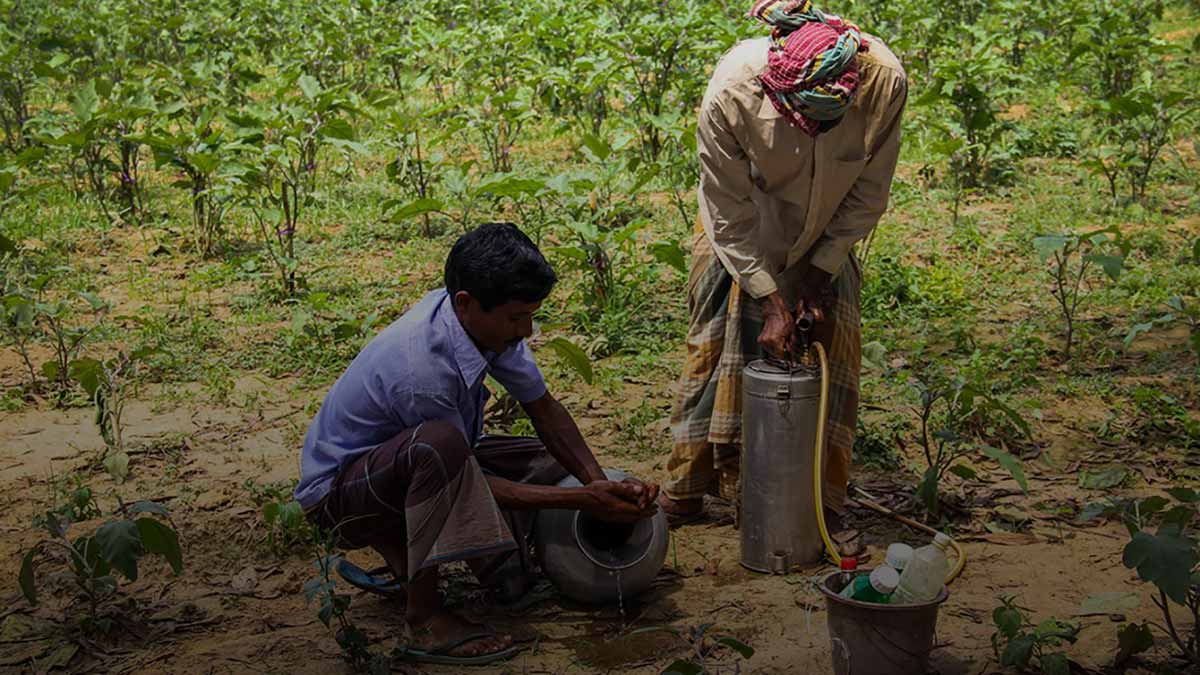Pesticides are the dominant control tactic for managing agricultural pests in Bangladesh and there was a 5-fold increase in the use of all agricultural pesticides (insecticides, herbicides and fungicides) between 1990 and 20101. In this same survey the use of insecticides increased more than 20-fold. This is especially troubling because insecticides are generally more toxic to human and environmental health. Neurotoxic insecticides, such as organophosphates and carbamates, comprised 60.4% and 28.6%, respectively, of all pesticides in the survey. Many of these insecticides have been banned or severly restricted elsewhere in the world because of known health impacts that include non-Hodgkins’ lymphoma, leukemia, lung cancer, aplastic anemia, fetal death, hormonal changes, birth defects and abnormal sperm, ovaries and eggs in humans2.
Insecticide use in Bangladesh is very particularly high on vegetables, especially on eggplant (brinjal) which is attacked by the eggplant fruit and shoot borer (EFSB). EFSB larvae bore into tender shoots and stunt plant growth and burrow inside fruits, making them unfit for human consumption. EFSB typically causes losses of 86% or more 3. A survey in the vegetable basket in the southwest of Bangladesh found that every farmer interviewed considered EFSB the most damaging pest of eggplant and 98% reported that insecticides were their only effective method of control. A majority of farmers interviewed reported spraying their eggplant crop nearly daily, adding up to 140 or more applications per season4. Such practices result in high residues on marketable fruit.
In Bangladesh there is widespread evidence that pesticides are also used inappropriately. In one survey of 820 farmers carried out in several districts in Bangladesh, 70% of the pesticides used were classed as “extremely or very hazardous” and 47% of farmers were found to be overusing them5. In the same survey, only 4% of farmers reported receiving basic training on the safe handling of pesticides, and 87% admitted that they did not use any protective measures when mixing and handling pesticides. It was also noted that farmers usually sprayed their crops bare-footed (only 1% even wearing sandals), only 2% wore gloves, 3% wore protective eye-glasses, and 6% wore home-made cotton masks. As a result of this widespread exposure, 26% reported experiencing multiple health effects, including headaches, eye and skin irritation, vomiting or dizziness. Farmers were not ignorant of the dangers because 75% knew that insecticides were harmful to themselves and others. This finding indicates that farmers use insecticides, despite their negative effects, because the economic returns from eggplant cultivation are essential for their livelihoods, and they have no other reliable options to protect their crop.
In addition to the health and environmental dangers presented by their current use, insecticides are also the single highest input cost in eggplant farming. Replacing insecticides with an effective alternative would bring substantial economic benefit to small-scale farmers in Bangladesh. Bt eggplant is such an alternative and its benefits are described below.
The role of Bt eggplant in reducing pesticide use
Host plant resistance to key pests is the foundation of integrated pest management (IPM)6. Despite decades of evaluating plant material and breeding, no eggplant has been found that provides high levels of resistance to EFSB7. However, the development of Bt eggplant provides that key tool to the IPM “toolbox” to economically and effectively manage EFSB 8. Past efforts have focused on using several IPM strategies to control EFSB but many of these tactics have met with limited success due to their cost, the labor involved and the complex nature of their approach9. However, they can be utilized with Bt eggplant to provide a more sustainable production system to control EFSB.
In contrast to broad-spectrum synthetic insecticide sprays, the Bt protein expressed in Bt eggplant only affects the larvae of the EFSB and will conserve beneficial insects 10. Bt is highly selective to caterpillars and is non-toxic to humans11. In fact, organic growers routinely use Bt as a foliar spray, although it is far less effective against EFSB when applied as a spray than when it is expressed in a Bt eggplant.
Studies in Bangladesh have shown that Bt eggplant provides complete control of EFSB without the need for additional sprays3. Several studies in Bangladesh have also confirmed the economic and health benefits of using Bt eggplant compared to traditional control methods. A study conducted in 35 districts of Bangladesh showed a six-fold increase in farm income and 61% decrease in pesticide costs12. Another study showed a 51% reduction in the number of pesticide applications, a 31% reduction in the cost of growing Bt eggplant, a US$400 increase in net profit per ha and a 10% decrease in human symptoms associated with pesticide exposure13. A 2020 study demonstrated that Bt eggplant provided an average of 19.6% higher yield and 21.7% higher revenue compared to non-Bt varieties14. The study also documented that 83.1% of Bt eggplant growers were satisfied with their yields and 80.6% were satisfied with the quality of fruit. This contrasts with non-Bt eggplant growers where 58.7% were satisfied with their yields and 28% indicated that a large portion of their fruit was infested with EFSB, which was not a concern for Bt eggplant. Overall, studies on Bt eggplant in Bangladesh have documented that Bt eggplant can help solve the pesticide problem in Bangladesh while providing economic benefit to farmers.
In the Philippines, Bt eggplant is not yet available to farmers because the regulatory approval process is still underway. However, as in Bangladesh, field studies in the Philippines have confirmed virtually complete control of EFSB without the use of supplemental insecticides15 and no effects on non-target arthropods16. Farmers, consumers and the environment in the Philippines will benefit once Bt eggplant is allowed to be used there, as has been demonstrated in Bangladesh.
________________________________________________________________
-
- 1.Pretty, J. & Bharucha, Z. P. Integrated Pest Management for Sustainable Intensification of Agriculture in Asia and Africa. Insects 6, 152–182 (2015).
- 2.He, F. Neurotoxic effects of insecticides–current and future research: a review. Neurotoxicology 21, 829–835 (2000).
- 3.Prodhan, M. Z. H. et al. Bt Eggplant (Solanum melongena L.) in Bangladesh: Fruit production and control of eggplant fruit and shoot borer (Leucinodes orbonalis Guenée. effects on non-target arthropods and economic returns. PLoS ONE 13, 0205713 (2018).
- 4.Rashid, M. A., Alam, S. N., Rouf, F. M. A. & Talekar, N. S. Socio-economic Parameters of Eggplant Pest Control in Jessore District of Bangladesh. (AVRDC-WorldVegetableCenter, 2003).
- 5.Dasgupta, S., Meisner, C. & Huq, M. Health Effects And Pesticide Perception As Determinants Of Pesticide Use : Evidence From Bangladesh | Policy Research Working Papers. https://elibrary.worldbank.org/doi/abs/10.1596/1813-9450-3776.
- 6.Kennedy, G. G. Integration of Insect-Resistant Genetically Modified Crops within IPM Programs. in Integration of Insect-Resistant Genetically Modified Crops within IPM Programs (eds. Romeis, J., Shelton, A. M. & Kennedy, G. G.) 1–26 (Springer Netherlands, 2008). doi:10.1007/978-1-4020-8373-0_1.
- 7.Taher, D. et al. World Vegetable Center Eggplant Collection: Origin, Composition, Seed Dissemination and Utilization in Breeding. Frontiers in Plant Science 8, 1484 (2017).
- 8.Shelton, A. M. et al. Bt Eggplant Project in Bangladesh: History, Present Status, and Future Direction. Front. Bioeng. Biotechnol. 6, (2018).
- 9.Cork, A., Alam, S. N., Rouf, F. M. A. & Talekar, N. S. Development of mass trapping technique for control of brinjal shoot and fruit borer, Leucinodes orbonalis (Lepidoptera: Pyralidae). Bulletin of Entomological Research; Cambridge 95, 589–96 (2005).
- 10.Romeis, J., Naranjo, S. E., Meissle, M. & Shelton, A. M. Genetically engineered crops help support conservation biological control. Biological Control 130, 136–154 (2019).
- 11.McClintock, J. T., Schaffer, C. R. & Sjoblad, R. D. A comparative review of the mammalian toxicity of Bacillus thuringiensis-based pesticides. Pesticide Science 45, 95–105 (1995).
- 12.Rashid, M. A., Hasan, M. K. & Matin, M. A. Socio-economic performance of Bt eggplant cultivation in Bangladesh. Bangladesh Journal of Agricultural Research 43, 187–203 (2018).
- 13.Ahmed, A. U. et al. Impact of Bt brinjal (eggplant) technology in Bangladesh. Project Report prepared for the U.S. Agency for International Development (USAID. (International Food Policy Research Institute, 2019).
- 14.Shelton, A. M., Sarwer, S. H., Hossain, M. J., Brookes, G. & Paranjape, V. Impact of Bt Brinjal Cultivation in the Market Value Chain in Five Districts of Bangladesh. Front. Bioeng. Biotechnol. 8, (2020).
- 15.Hautea, D. M. et al. Field performance of Bt eggplants (Solanum melongena L.) in the Philippines: Cry1Ac expression and control of the eggplant fruit and shoot borer (Leucinodes orbonalis Guenée). PLoS ONE 11, (2016).
- 16.Navasero, M. V. et al. Assessing potential impact of Bt eggplants on non-target arthropods in the Philippines. PLoS ONE 11, (2016).





